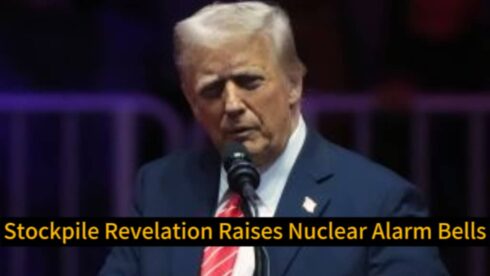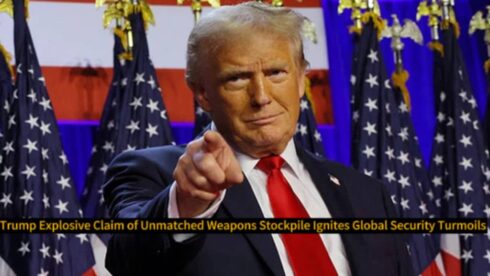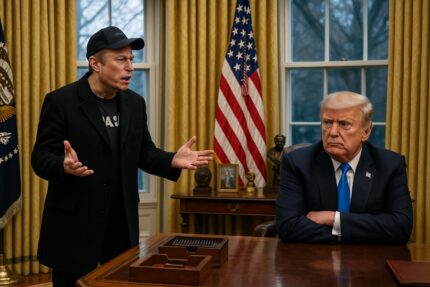Donald Trump took to X (formerly Twitter) with a message that instantly ignited controversy worldwide. “Just had a great talk with our Military Leaders. It is the strongest Military we have ever had,” he tweeted. “We are stockpiling weapons at a rate never seen before by our country. Hopefully, however, we will never have to use them!” The statement, posted early morning, quickly drew intense attention across political, military, and diplomatic spheres, triggering sharp commentary from allies and adversaries alike.
Critics were quick to question the timing and intent behind the statement. With global tensions rising—particularly concerning Russia, China, and Middle East dynamics—Trump’s tweet has raised eyebrows about potential implications for U.S. foreign policy and global security. Military analysts pointed out that such public declarations about arms stockpiling could signal deterrence—or provocation.
Stockpile Revelation Raises Nuclear Alarm Bells
Donald Trump’s revelation about unprecedented weapons accumulation has reignited nuclear arms race anxieties. While Trump did not specify whether the stockpiling included nuclear arms, his history of vague yet impactful statements has left experts speculating. Arms control advocates argue that such rhetoric undermines decades of diplomatic efforts aimed at de-escalation and disarmament.
International observers, especially from NATO and the United Nations, voiced concern about the transparency and intent behind the U.S. military’s current build-up. “This is not the time to trumpet stockpiles—it’s the time to reinforce arms control agreements,” said a European diplomat under anonymity. Trump’s tweet, while brief, has become a flashpoint in the ongoing debate over the militarization of diplomacy.
Domestic Political Fallout: Hawks Cheer, Doves Warn
Donald Trump’s message was met with divided reactions on the domestic front. Conservative commentators and Republican allies amplified the message, arguing that a formidable arsenal deters adversaries and reinforces America’s position on the global stage. “It’s peace through strength,” one senator noted in public commentary supporting the tweet.
Conversely, Democratic lawmakers and progressive policy groups sounded alarms over the lack of legislative oversight on weapons stockpiling. “This isn’t leadership—it’s saber-rattling in a digital soundbite,” said a prominent Democratic representative. Critics insist the comments could erode trust with international partners and spur a new era of unchecked militarization.
International Reactions: Cautious Allies, Alarmed Rivals

Donald Trump’s statement sent diplomatic shockwaves across the globe. NATO allies responded with a mix of caution and concern, attempting to clarify the U.S. defense posture without endorsing Trump’s inflammatory tone. German and French officials emphasized the need for continued dialogue and strategic balance, subtly distancing themselves from unilateral weaponization rhetoric.
Meanwhile, adversarial nations like Iran, North Korea, and China issued sharp rebukes. Chinese state media accused Trump of “reviving Cold War dynamics,” while Iranian clerics called the tweet a “veiled threat cloaked in American arrogance.” Analysts suggest Trump’s digital bravado may inadvertently trigger countermeasures, escalating already fragile geopolitical standoffs.
Military Insiders Walk a Fine Line
Donald Trump’s mention of “great talks” with military leaders has placed Pentagon officials in an awkward position. While no official press release has corroborated Trump’s statements, sources within the Department of Defense confirmed increased procurement initiatives under the guise of modernization. However, they deny any reckless escalation or deviation from existing defense strategies.
Privately, some senior defense officials worry about being dragged into political theater. “Weapon stockpiling is nuanced—guided by threat assessments, budget allocations, and strategic timelines. Tweets don’t capture that,” a former Joint Chiefs adviser told Politico. The military establishment appears keen on avoiding politicization while maintaining strategic clarity amidst Trump’s provocative messaging.
Strategic Messaging or Risky Provocation?
Donald Trump’s latest tweet can be seen as a deliberate signal of strength aimed at deterring adversaries amid rising global tensions. By painting a picture of an unrivaled American arsenal, he reinforces a narrative of unmatched military power designed to command respect on the world stage.
However, this approach carries risks of exacerbating international instability. Political analysts caution that such declarations, absent clear diplomatic context, may inflame already tense relations and provoke an arms race. The balance between deterrence and provocation remains a delicate one, and Trump’s tweet has thrust it back into the spotlight.














